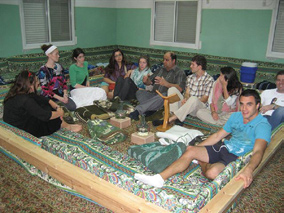
Photo by Lydia Aisenberg
Three months into the five-month MASA- Givat Haviva Intensive Arabic Semester, students from Britain and America are making positive inroads into the languages and diverse cultures of Arabs and Jews in Israel.
With a focus on learning Arabic, the students – four from Britain, one Columbian and four from the United States are also studying Hebrew, Jewish and Arab history, general Middle East studies, Israel studies and much more, truly living up to the name of the program – the Intensive Arabic Semester.
Students, who range in age from 18-30, undertake community work in neighboring Arab villages and at the end of the program, with 500 class hours of Arabic tuition and 70 hours of Hebrew lessons they are able to attain a good level of spoken Arabic, get by in Hebrew and understand the dos and do nots of the diverse societies they are moving between during the semester.
William Robbins, a University of Mississippi graduate, hails from Birmingham, Alabama and teacher Kerrie Sharron is also from Birmingham – but in England.
"When I graduated I had this idea that I could better understand myself by understanding more of the world. I called it an exercise in perspective," explains the lanky Alabaman who is one of the two students enrolled in the program who had never visited Israel before signing up for the Intensive Arabic Semester.
"Seeing that I had little money to travel the world to really experience its people, I had to choose wisely the destination that could offer me the most challenging exercise. For me that place was Israel," states Will emphatically.
Searching websites for ideas of how to spend time in Israel, Will came across the website dictionary.com whose "word for the day" was kibbutz.
"Now, I am not Jewish and the fine people of Mississippi and my home in Alabama do not throw around the word “kibbutz” in daily life, so when I read about kibbutz, I had to read more and my research ultimately led me to the MASA and the Givat Haviva Intensive Arabic Semester. Learning the Arabic and Hebrew languages from an organization dedicated to reconciling Arab and Israeli relations seemed perfect for my exercise in perspective – I could challenge myself intellectually, socially and culturally amongst students from all over the world and so here I am – and I am certainly not disappointed, " he said, and cracked a joke about how his Southern accent must sound in Arabic and Hebrew.
Kerrie Sharon had studied basic Hebrew in Israel in the past but had not attempted Arabic.
"I decided to leave my job and life at home in order to pursue an interest in peace education and learning more about the ways that education was being used as a pathway to build confidence and co-existence between Arabs and Jews in Israel," she says.
"I have a firm belief in the power of education to build bridges in conflict situations from my work at home as a citizenship teacher. A personal interest in the conflict in Israel led to my being very interested in the various peace and coexistence education projects going on in the country and I was looking for an avenue to come to Israel and work in this field. I eventually realized that I would have to speak the languages in order to undertake effective educational work, so the program was ideal for me in terms of allowing me to be associated with Givat Haviva and learn about their work whilst also developing language abilities," said Kerrie who has also been participating in the Givat Haviva “Through Others' Eyes” project bringing Jewish and Arab women together through a common interest in photography.
Based at Barkai, a kibbutz founded in 1947 by members of the Hashomer Hatzair movement together with Holocaust survivors from Europe, and neighboring the Givat Haviva campus, students experience first hand life in the ‘unique to Israel’ community, quickly becoming part of the daily scenery for the Barkai members and their families. A short walk away from the main Nahal Eiron -Wadi Ara highway, the kibbutz and Givat Haviva are situated in a region where Jewish and Arab communities, large and small, live side by side, the local Menashe municipality representing both the Jewish and Arab populations in the vicinity.
The region consists of cooperative kibbutzim; private farmsteads (moshavim); secular and religious Jewish communities of a non-agricultural character; Israeli Muslim Arab villages from a few hundred residents to 60,000 and two cities, Umm al-Fahm and Baka al-Gharbiya, the latter maintaining their own elected municipalities but who today work closely with the neighboring Menashe and Megiddo municipalities in a series of joint ventures.
"In the past I didn't know how to align my enjoyment of being in Israel and the deep attachment that coming here stirred in me, whilst at the same time feeling discomfort at some of Israel's actions and the situation of Arabs in Israel and Palestine," further explains Kerrie.
"This program has allowed me to learn beyond the rhetoric through classes and through meeting people from both communities – to learn to understand more deeply the motivations for Israel's actions, to find new ways of understanding the issues and dilemmas underlying the painful and enduring conflict."
Twenty-eight year old Seth Norman comes from a liberal Jewish family in San Francisco, was never a member of a synagogue or Jewish youth movement and his first visit to Israel was in recent times – during a break in serving in the United States Army stationed in Germany, Kuwait and Iraq.
"Last July when I returned to base in Frankfurt from Iraq I was given two weeks leave. I decided on a whim to spend them in Tel Aviv, basically looking for a little bit of privacy in peaceful surroundings after spending 15 months with 80 men in a 60 man tent," says Seth, who graduated University of California at Berkeley before serving five years in the US army "because I felt I needed to give something to my country."
After a few days in Tel Aviv the American soldier on leave met up with Israelis who 'adopted' him.
"I had a great time and signing up for the Intensive Arabic Semester answered my search to find a reason to spend time in Israel and learn more about my heritage. In Iraq I always had to work with interpreters and found it really frustrating seeing all this beautiful script everywhere and not being able to read or understand a thing."
Following a month of studies at Givat Haviva, Seth met a group of San Franciscans on a Zionist Federation mission, visiting the center and taking a short tour of the region.
"I was amazed to see people from back home, particularly considering I grew up in a tiny town called Hillsborough about 20 minutes south of San Francisco. I had not realized that I had family friends who were so involved in understanding life in Israel and working to keep the link between American and Israeli Jews strong."
Some members of the group were parents of former classmates from San Mateo High School.
"I was raised with the full understanding that I was Jewish, but with none of the religious and cultural foundations – this is all now being strengthened during my study period here in Israel," said Seth who intends taking another degree in business studies at university in the U.S later this year.
History graduate Matthew Keston is a Londoner who came to Israel last year on a Birthright 10 day tour. He also spent some time volunteering on Kibbutz Lotan in the Negev.
"These experiences made me want to find out more about Israel and its history as I feel a big part of understanding Israel is not only to learn about the Jewish history but to also learn Islamic history and the position of Arabs in Israel, past and present, in and out of what is today Israel.
"This program was the only one that offered both sides of the Israeli coin and I hope to use the knowledge I gain from this course to better my understanding of the conflict and to use the skills I learn to bridge cultural differences between those of different ethnic and religious backgrounds back home in England," said Matthew, who made a film on behalf of Birthright during his tour here last year.
Eriana Rivera-Rozo, who holds a Masters in Conflict Management, is a Colombian living in the United States since her teens. Like Will Robbins, Eriana discovered the Intensive Arabic Semester through a website.
"I was actually searching for "kibbutz" and "six months" in an attempt to find a commune-like community where I could get away from corporate America. I worked for an international corporation for six years and grew disillusioned with the idea of working for a cause that I did not feel passionate about, and was looking for a quiet place away for a short sabbatical and my mother suggested that I look into a kibbutz."
Twenty-five years beforehand her mother had participated in a medical program in Israel and had fallen in love with the country.
"During her stay she had found that she had Jewish blood, after doing some genealogical searching in the Diaspora Museum, and returned to Columbia with a passion for this nation and its people," explains Eriana who had wanted to learn Arabic for some time but felt that the only way to do so was to live in an immersed environment.
"Offering a holistic experience, not only focusing on Arabic but also being involved with Arab and Jewish communities, really piqued my interest."
Asked by many why she chose to study Arabic in Israel and not in Jordan, Lebanon or Egypt, Eriana explains that on a practical note – as a Colombian citizen – Israel was the only country for which she did not need a visa, and secondly, felt more comfortable studying Arabic in a non-Muslim country because as a woman she had her reservations.
"I felt that Israel offered exposure to the Arab community without taking away the Western secular social dynamic to which I was used and another component in the decision making was the fact that the Intensive Arabic Semester is affiliated with Givat Haviva. I was very interested in their work toward coexistence and cooperation and wanted to be involved with an institution that was engaged in some sort of resolution between the political and cultural divide between the Arab and Jewish cultures."
With two months left until the end of the semester Eriana says she "wouldn't trade the experience – the people in the program, although very different are interesting and I am happy to have met them and had the opportunity to study with them."
The youngest of the nine students, 18 year old Dodie Shoshan comes from Aberdeen in Scotland. Dodie had heard about the Intensive Arabic Semester whilst volunteering at Kibbutz Hazorea – where her mother Etti had volunteered in 1970.
"I wanted to study Arabic because it is such a beautiful language with a huge vocabulary and wealth of literature," explains Dodie who worked in the Hazorea dining-room before becoming a student living at Kibbutz Barkai.
"I find the Middle East absolutely fascinating and I am considering aliyah, serving in the IDF and would like to find a purposeful position during army service - possibly using Arabic."
The reasons for tackling the program vary indeed but the students share the pressure of intensive studying, community work in Wadi Ara Arab villages, battling homework assignments and just making it through to the end of the week – somewhat exhausted but with a great deal more knowledge and experience of the complexities in the region – and some more leisurely days shared when out on field trips to the Golan and Galilee, visiting the Druze on the Carmel, Jerusalem and more.
"I have no idea yet where and what I will do at the end of the program," comments Will Robbins. "Sometimes I see myself staying here continuing the adventure in true romantic style, but if the adventure ends I will have no shame in returning home with my newfound knowledge.
"I believe Israel has made me a better citizen of the world because of its challenges. It forces me to rethink my values, evaluate opinions and make responsible changes. I hope to share that when I return – and Israel, prepare yourself for more Southerners," he says with a laugh.
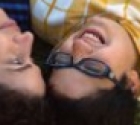 A PLACE OF THEIR OWN
A PLACE OF THEIR OWN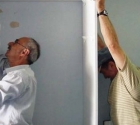 THANK YOU!
THANK YOU!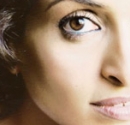 DEAR EDITOR 156
DEAR EDITOR 156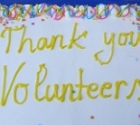 A new website in English - on Volunteering - Launched in Israel
A new website in English - on Volunteering - Launched in Israel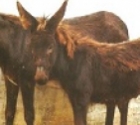 Help Needed for Abused Horses and Donkeys
Help Needed for Abused Horses and Donkeys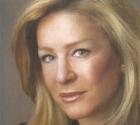 Heather's Heseg
Heather's Heseg Lydia Aisenberg
Lydia Aisenberg